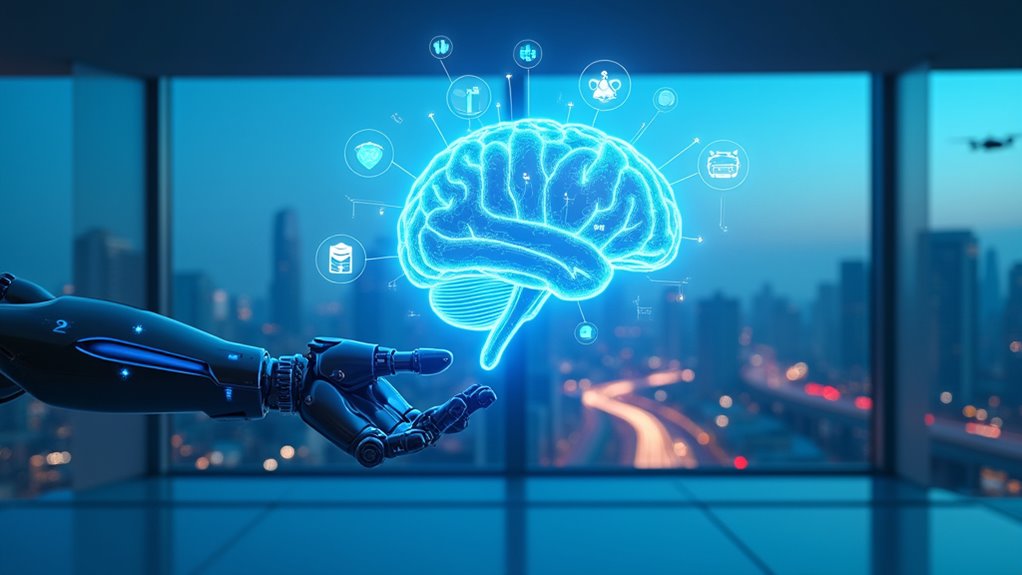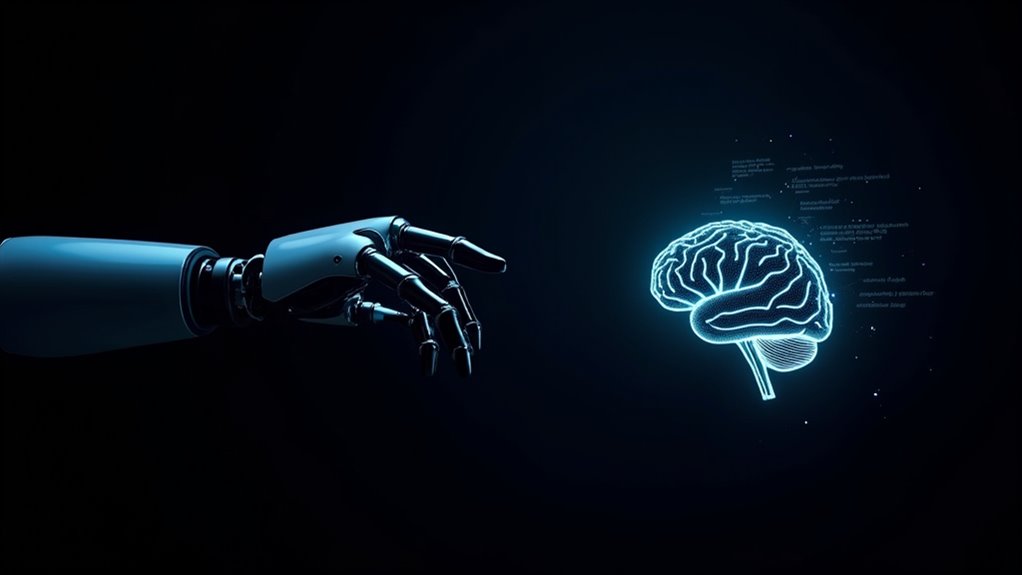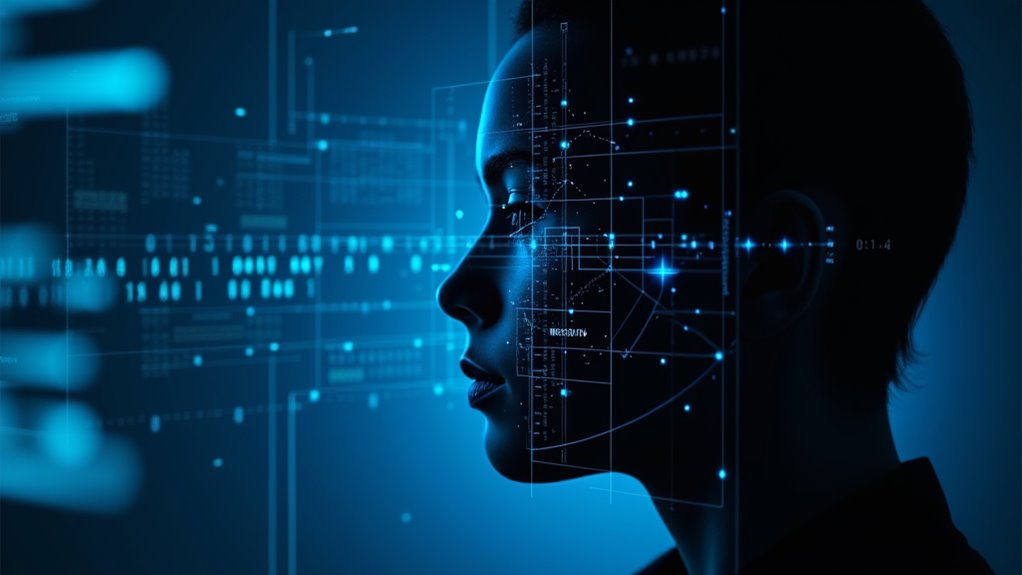Artificial intelligence wasn’t created by a single person. Its roots stretch back centuries, from Archytas’s mechanical pigeon (400 BCE) to early philosophical concepts of artificial beings. Modern AI emerged formally in 1956 when John McCarthy coined the term at the Dartmouth Conference, building on Alan Turing’s foundational work. Many contributors shaped AI’s evolution—mathematicians like Boole and Bayes, computer scientists like Weizenbaum, and neural network pioneers like Hinton. The full story reveals a fascinating collaborative journey.

When people ask who created artificial intelligence, they’re often surprised to learn there’s no single inventor to credit. The journey of AI spans thousands of years, with roots stretching back to ancient civilizations. Those AI pioneers established historical milestones long before computers existed, beginning with Archytas and his self-moving mechanical pigeon around 400 BCE. Yes, people were dreaming about machines that could think for themselves even before electricity was harnessed!
The path to modern AI wasn’t straightforward. Greek philosophers contemplated artificial beings, while Jonathan Swift‘s *Gulliver’s Travels* described a primitive computing device in 1726. These weren’t just fanciful ideas—they planted seeds that would later bloom. Thomas Bayes’ probability work (1763) and George Boole’s logical systems (1854) created the mathematical foundation AI would eventually require. These early philosophical inquiries about thinking machines laid crucial intellectual foundations for the formal field of AI that would emerge centuries later.
Move forward to the 20th century when things got serious. Alan Turing asked the essential question in 1950: “Can machines think?” His Turing Test remains relevant today. But the official birth of AI came in 1956, when John McCarthy organized the Dartmouth Conference and coined the term “artificial intelligence.” Geoffrey Hinton’s groundbreaking work on neural networks in 2012 represented another crucial milestone in AI’s development. Think of it as AI’s coming-out party.
The field exploded afterward. Arthur Samuel‘s checkers program taught itself to play better than its creator. The Logic Theorist solved mathematical problems like humans. Frank Rosenblatt’s Perceptron introduced neural networks. And ELIZA, created in 1966, convinced some users they were chatting with a real therapist! Joseph Weizenbaum’s development of ELIZA represented one of the earliest conversational programs capable of mimicking human interaction.
Despite setbacks during the “AI Winter” of reduced funding, persistent researchers kept pushing forward. Their collective efforts—not any single genius—created the AI we understand today.
Modern AI’s capabilities emerged from generations of mathematicians, philosophers, and computer scientists building upon each other’s work. So next time someone asks who invented AI, tell them: everyone and no one. It’s humanity’s collective creation, born from our persistent dream of creating machines that think.
Frequently Asked Questions
When Did AI Research Officially Begin?
AI research officially began in 1956 at the Dartmouth Conference, where John McCarthy coined the term “artificial intelligence.” This summer workshop marked the formal establishment of AI as an academic discipline.
However, groundwork was laid earlier when Alan Turing published his paper introducing the Turing Test in 1950, proposing a method to determine if machines could think.
These two events—the conference and Turing’s work—represent the official genesis of AI research as we understand it today.
How Has AI Evolved Over the Decades?
AI has evolved dramatically over decades! From simple neural networks in the 1950s to today’s sophisticated systems, the journey has been wild.
The field survived the “AI winter” of the 1970s, rebounded with expert systems in the 1980s, and exploded with machine learning breakthroughs in the 2010s.
Each decade brought new capabilities—from beating chess champions to generating human-like text.
Want proof of progress? Just look at what you’re reading right now!
What Countries Lead AI Development Today?
The global AI race is heating up, with the US leading through massive tech investments and innovation hubs like Silicon Valley.
China’s advancements are remarkable, rapidly closing the gap with substantial government backing and ambitious 2030 goals.
European nations contribute through pioneering AI regulations that shape global standards.
South Korea and Japan excel in specialized AI applications, particularly robotics.
Despite competition, international AI collaboration remains essential for addressing global challenges—though countries clearly want to plant their flag first in this digital frontier.
Are There Ethical Frameworks Governing AI Creation?
Yes, AI ethics frameworks exist but remain fragmented globally. Organizations like IEEE and Partnership on AI have created guidelines addressing moral implications of artificial intelligence development.
Regulatory challenges persist as governments struggle to keep pace with innovation. Companies implement various accountability measures—from ethics boards to algorithmic impact assessments—but enforcement varies widely.
The field continues evolving, with increasing calls for standardized oversight balancing innovation against potential harms. Implementation, however, remains inconsistent across different regions and companies.
How Does Quantum Computing Affect AI Development?
Quantum computing supercharges AI development through specialized quantum algorithms that process complex calculations exponentially faster than classical computers.
When quantum supremacy is achieved (where quantum computers outperform classical ones), AI systems can tackle previously impossible problems. This quantum advantage accelerates machine learning training, enhances pattern recognition, and enables more efficient data processing.
While still emerging technology, the quantum-AI partnership promises revolutionary capabilities in healthcare, financial modeling, and autonomous systems—if researchers can overcome current stability challenges.









